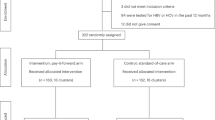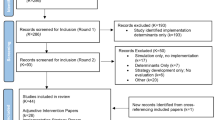Abstract
HIV testing during pregnancy facilitates timely antiretroviral treatment for HIV-positive women. This study identifies reasons for late HIV testing among pregnant women delivering at a hospital in Ho Chi Minh City. We conducted a case–control study in which 160 cases were women who were tested for HIV late (i.e., at labor and delivery) and 160 controls were women who were tested during antenatal care (ANC). In multivariable logistic regression analysis, six variables were associated with late HIV testing: age less than 30 years, nine or fewer years of education, working as a homemaker or worker/farmer, living 20 km or more from the hospital, having received ANC at a private clinic/hospital only, and not believing that HIV testing is important during pregnancy. We recommend that national programs should provide additional effort for HIV testing during pregnancy to young women, less educated women, homemakers, and those receiving ANC at private clinics and hospitals.
Similar content being viewed by others
References
Ministry of Health. Vietnam HIV/AIDS estimates and projections 2011–2015. Long NT, editor. Hanoi: Medical Publishing House; 2013.
General Statistics Office of Vietnam. Statistical yearbook of Vietnam 2014. https://www.gso.gov.vn/default_en.aspx?tabid=515&idmid=5&ItemID=15197.
Ministry of Health. Sentinel surveillence trends among pregnant women. 2010.
Ministry of Health. HIV/STI Sentinel surveillence trends among pregnant women. 2014.
Ministry of Health. Decision No.4139/QĐ-BYT dated 02/11/2011 regarding amendment and supplements of several items into “guidelines for diagnosis and treatment of HIV/AIDS” issued together with decision no. 3003/QĐ-BYT, signed by the Health Minister on 9/8/2009. Hanoi; 2009.
Division of Mother and Child Health—Ministry of Health. Comprehensive Report of the National Mother and Child Health Activities of 2015 and Planning for 2016. Hanoi; 2015.
Pasteur Institue HCMC. Annual Report for Regional Conference on HIV/AIDS Control and Prevention in 20 Southern Provinces (the 2012 summary and 2013 Planning). 2013.
Pasteur Institue HCMC. Annual Report for Regional Conference on HIV/AIDS Control and Prevention in 20 Southern Provinces (the 2011 summary and 2012 Planning). 2012.
Pasteur Institue HCMC. Annual Report for Regional Conference on HIV/AIDS Control and Prevention in 20 Southern Provinces (the 2014 summary and 2015 Planning). 2015.
Ministry of Health. National Strategy for HIV/AIDS Control and Prevention up to 2020 and 2030 vision (the 5th draft). 2012.
Ministry of Health. Routine report for HIV/AIDS indicators in year 2015 according to Circular 03/2015/TT-BYT. 2015.
Nguyen LT, Christoffersen SV, Rasch V. Uptake of prenatal HIV testing in Hai Phong Province, Vietnam. Asia-Pacific J Public Health. 2010;22(4):451–9.
Hanh NT, Gammeltoft TM, Rasch V. Number and timing of antenatal HIV testing: evidence from a community-based study in Northern Vietnam. BMC Public Health. 2011;11:183.
Pharris A, Nguyen TK, Tishelman C, Brugha R, Nguyen PH, Thorson A. Expanding HIV testing efforts in concentrated epidemic settings: a population-based survey from rural Vietnam. PLoS ONE. 2011;6(1):e16017.
Truong TH, Le TKP, Pham THL, Nguyen TKC, Le TG. Survey for KAB on HIV/AIDS and PMTCT among pregnant women and women at child-bearing age in Ho Chi Minh City, 2009. J Pract Med. 2010;742+743(4).
Osinde MO, Kaye DK, Kakaire O. Intimate partner violence among women with HIV infection in rural Uganda: critical implications for policy and practice. BMC Womens Health. 2011;11:50.
Dude AM. Spousal intimate partner violence is associated with HIV and other STIs among married Rwandan women. AIDS Behav. 2011;15(1):142–52.
HCM City AIDS Committee. 5-year—Summary Report on PMTCT Program. 2009.
Nhung VT. Evaluating the model “combine counseling between medical staff and trained peer counselors” of PMTCT program in Hung Vuong Hospital (2010–2011). J Prev Med. 2011;4(124):5.
Anand A, Shiraishi RW, Sheikh AA, Marum LH, Bolu O, Mutsotso W, et al. Site factors may be more important than participant factors in explaining HIV test acceptance in the prevention of mother-to-child HIV transmission programme in Kenya, 2005. Trop Med Int Health. 2009;14(10):1215–9.
Hardon AP, Oosterhoff P, Imelda JD, Anh NT, Hidayana I. Preventing mother-to-child transmission of HIV in Vietnam and Indonesia: diverging care dynamics. Soc Sci Med. 2009;69(6):838–45.
Ministry of Health. National plan of action for prevention of mother to child HIV transmission (PMTCT) 2006–2010 period. Hanoi. 2006.
Creek T, Ntumy R, Mazhani L, Moore J, Smith M, Han G, et al. Factors associated with low early uptake of a national program to prevent mother to child transmission of HIV (PMTCT): results of a survey of mothers and providers, Botswana, 2003. AIDS Behav. 2009;13(2):356–64.
Sarker M, Sanou A, Snow R, Ganame J, Gondos A. Determinants of HIV counselling and testing participation in a prevention of mother-to-child transmission programme in rural Burkina Faso. Trop Med Int Health. 2007;12(12):1475–83.
Fanta W, Worku A. Determinants for refusal of HIV testing among women attending for antenatal care in Gambella Region, Ethiopia. Reprod Health. 2012;9:8.
Maedot P, Haile A, Lulseged S, Belachew A. Determinants of VCT uptake among pregnant women attending two ANC clinics in Addis Ababa City: unmatched case control study. Ethiop Med J. 2007;45(4):335–42.
WHO. Reproductive choices for women with HIV 2009. http://www.who.int/bulletin/volumes/87/11/08-059360/en/.
Acknowledgements
We wish to thank various people for their contributions to this study: Ms. Nguyen Kim Ngan and her team at Hung Vuong Hospital for their help in collecting data; Ms. Pham Thi Minh Hang and the staff at Pasteur Institute of Ho Chi Minh City for their valuable support on supervision and data entry; Mr. Patrick Nadol from CDC PEPFAR Vietnam for his valuable technical advice in the protocol development; Dr. Marta Ackers and Dr. Sheryl Lyss from CDC PEPFAR for their valuable reviews and comments on this manuscript; CDC PEPFAR and Global Health Sciences, UCSF for their final support on this study. We wish to acknowledge support from the University of California, San Francisco’s International Traineeships in AIDS Prevention Studies (ITAPS), U.S. NIMH, R25MH064712; and from the CV Starr Foundation. Special thanks should be given to all participants who participated in this study and made it possible.
Funding
This study was funded by the President’s Emergency Plan for AIDS Relief (PEPFAR) through the U.S. Centers for Disease Control and Prevention under the terms of PS001468. Further support was provided by the University of California, San Francisco’s International Traineeships in AIDS Prevention Studies (ITAPS), U.S. NIMH, (Grant Number R25MH064712); and the CV Starr Foundation.
Author information
Authors and Affiliations
Corresponding author
Ethics declarations
Conflict of interest
All the authors declare that they have no conflict of interest.
Ethical Approval
All procedures performed in studies involving human participants were in accordance with the ethical standards of the institutional and/or national research committee and with the 1964 Helsinki Declaration and its later amendments or comparable ethical standards.
Informed Consent
Informed consent was obtained from all individual participants included in the study.
Rights and permissions
About this article
Cite this article
Khuu, V.N., Nguyen, V.T., Hills, N.K. et al. Factors Associated with Receiving Late HIV Testing Among Women Delivering at Hung Vuong Hospital, Ho Chi Minh City, Vietnam, 2014. AIDS Behav 22, 629–636 (2018). https://doi.org/10.1007/s10461-017-1692-y
Published:
Issue Date:
DOI: https://doi.org/10.1007/s10461-017-1692-y




